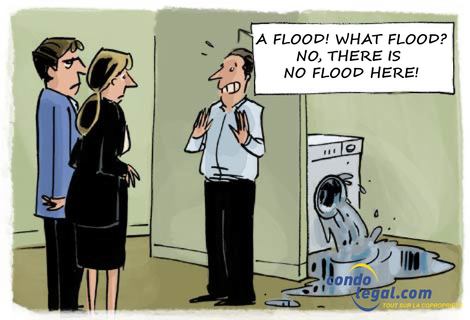Water damage: whose fault is it?
 Water damages are the most frequent loss in co-ownerships (condominiums). The concept of water damage also includes the civil liability of the syndicate, the co-owner and the lessee (tenant) who could be responsible in the event of damages suffered by third party members; thus, the question of who is responsible for this constantly arises. However, it is necessary to know the law applicable to the person at fault. Other considerations affect both the insurer of the syndicate and that of the concerned co-owners in order to determine who will pay what; water damage can originate from a private portion but also from a common portion.
Water damages are the most frequent loss in co-ownerships (condominiums). The concept of water damage also includes the civil liability of the syndicate, the co-owner and the lessee (tenant) who could be responsible in the event of damages suffered by third party members; thus, the question of who is responsible for this constantly arises. However, it is necessary to know the law applicable to the person at fault. Other considerations affect both the insurer of the syndicate and that of the concerned co-owners in order to determine who will pay what; water damage can originate from a private portion but also from a common portion.
Place of origin of the disaster
The identification of what is private versus common is important in determining civil liability in the event of the occurrence of a loss generated by water damage; indeed, according to the qualification of the installation at the origin of the disorders, the commitment of the responsibility will fall on:
- the syndicate of co-owners when it is a common portion that is the cause of the damage (example: piping and wiring that burst because of the frost);
- the occupying or non-occupying co-owner when it is a private installation under his custody and his responsibility that is the cause of the damage (example: a leaking water heater);
- the occupant other than the co-owner when the installation that is the cause of the damage is in his custody and his responsibility.
Special case of common portions for restricted use
In the event that the place of origin of the disaster is a common portion for restricted use, civil liability shall be established as follows:
Civil liability insurance of the co-owner
Each co-owner is required to have civil liability insurance coverage of which the minimum mandatory amount of insurance is determined by government regulation against the risks of civil liability for which he must be responsible in his capacity as a co-owner occupant or non-occupant.
Syndicate liability insurance
The law obliges any syndicate of co-owners to have insurance covering its civil liability towards third party members; most declarations of co-ownership also require it. In terms of water damage, insurance is essential since it offers protection to all co-owners when their liability is incurred collectively towards third party members including the co-owners or the other occupants of the immovable.
 WHAT YOU SHOULD KNOW! A syndicate of co-owners may rely on the presumption of fault stipulated at section 1465 of the Civil Code of Québec in order to establish the liability of a co-owner; the latter can reject this presumption and exonerate himself by proving that he has not committed any fault.
WHAT YOU SHOULD KNOW! A syndicate of co-owners may rely on the presumption of fault stipulated at section 1465 of the Civil Code of Québec in order to establish the liability of a co-owner; the latter can reject this presumption and exonerate himself by proving that he has not committed any fault.
 WHAT TO KEEP IN MIND: Civil liability insurance for co-owners specified at section 1064.1 of the Civil Code of Québec has become mandatory since October 15, 2020; it covers the liability of co-owners towards third party members.
WHAT TO KEEP IN MIND: Civil liability insurance for co-owners specified at section 1064.1 of the Civil Code of Québec has become mandatory since October 15, 2020; it covers the liability of co-owners towards third party members.
 WARNING! The insurance regulation published in the Gazette officielle du Québec on April 15th, 2020 mentions that the minimum amount of liability insurance that a co-owner must hold is:
WARNING! The insurance regulation published in the Gazette officielle du Québec on April 15th, 2020 mentions that the minimum amount of liability insurance that a co-owner must hold is:
- 1 million dollars if the immovable has fewer than thirteen fractions used or capable of being used as a dwelling unit or for carrying on a business;
- 2 million dollars if the immovable has 13 or more fractions.
Back to the factsheet: Water damages